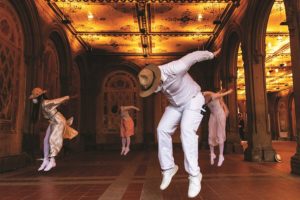Putting on a festival of live theater — both indoors and outdoors — while the pandemic continues to rage is a risky and frustrating process. Yet that’s exactly what the Provincetown Tennessee Williams Theater Festival, the annual celebration of the renowned playwright who lived and loved here, is about to do from Thursday, Sept. 23 through Sunday, Sept. 26.
Curator David Kaplan, a founder and guiding force of the festival, now in its 16th year, has invited theater companies from around the world to stage work by Williams and other artists throughout Provincetown. “The sensationalistic [Covid] news in July was very daunting for us, but it didn’t scare any of the artists away,” he says. “We normally get housing in July, sell tickets in July, but this year that had to wait.”

The 400th anniversary of the “departure” of the ultraorthodox Puritans on the Mayflower from Provincetown, as the festival puts it, inspired its defiance-of-censorship theme of “independent thinking.” Covid, which forced the world into lockdown in 2020, put the kibosh on most of the September festival’s plans last year, except The Municipal Abattoir, a short Kafka-esque play by Williams that was staged on the dune above the Grace Hall parking lot for the benefit of a drive-in audience.
The Municipal Abattoir will return this year, accompanied by the rest of the censorship-breaking program that was postponed last fall. Three other works by Williams will be featured: Battle of Angels, a rarely produced 1940 play about three women in a Mississippi small town with eyes for a good-looking stranger, which the Boston League of Decency effectively blocked from reaching Broadway; Why Did Desdemona Love the Moor?, a new adaptation of a Williams short story about an interracial affair that he never finished drafting into a play or screenplay; and The Demolition Downtown, a 1971 play in which a suburban family hears explosions around them but can only imagine what’s happening because news outlets are silenced.

Also included in the festival: The Witch, a 1616 satire of heretical behavior by Thomas Middleton, staged by Megan Nussle in the National Seashore with an all-woman cast; The Mahagonny Songspiel, a cabaret revue by Bertolt Brecht and Kurt Weill that was condemned by the Nazis at its 1927 German premiere; Mae West’s Sex, a 1926 Broadway smash that was shut down for obscenity and led to the brief incarceration of its star and author; and Longing Lasts Longer, a “rock ’n’ roll manifesto” by Penny Arcade.
The festival is also offering two “lagniappes” — a New Orleans tradition of thrown-in extras — “Tennessee’s Latest Peep Show,” performed by neo-burlesque artist Lefty Lucy, 2011 winner of Miss Coney Island USA; and “Cut Blanche,” with Jef Hall-Flavin, juxtaposing scenes from A Streetcar Named Desire with a live reading of the excised naughty bits. Lefty Lucy and Penny Arcade will also host workshops, and the Tennessee Williams Institute will hold seminars.
Because of the Mayflower connection, “We had planned 2020 to be an all-American season,” Kaplan says. “That ended up working in our favor, because it would have been impossible to bring foreign companies here. But the real story is how companies kept their projects fresh.
“Jessica Burr and Blessed Unrest have been working on Battle of Angels for two years,” Kaplan continues. “She just performed it at the Bethesda Fountain in Central Park. Women openly lusting, as in Battle of Angels, is also part of Mahagonny, which the AllWays Lounge is presenting. I saw these people perform in a dive bar in New Orleans, a place that smells of lube and booze.”

Desdemona, Kaplan says, “is unfinished, but Thomas Owen Mitchell, who’s a scholar of early Williams plays and stories, makes that part of the drama. The narrator is a provocateur. Various drafts are left unresolved — it’s like Rashomon.” The University of Illinois at Urbana-Champaign Dept. of Theatre is bringing Mitchell’s version to Provincetown.
To keep The Demolition Downtown fresh, Philadelphia’s Die-Cast ensemble has been performing the play in suburban homes. Taking work into relevant settings is a long-standing Williams festival practice — Sex, for example, will be performed at tea dance at the Boatslip.
Kaplan is especially passionate about the censorship theme because Williams had always been attracted to forbidden material. “It was the impulse of the emperor’s new clothes,” he says. “Things that were never spoken, or, at most, spoken in whispers, had to be said. That was the moral impetus of why his plays had to be performed, and why we are having this festival.”
Though Covid set productions back, Kaplan notes that it “allowed me to live like a hermit. I wasn’t directing or teaching. I could write.” Indeed, his book Shakespeare, Shamans, and Show Biz: An Impolite Guide to Theater History will be published this week. “The advantage was we could plan for the next two years,” Kaplan says. But with ticket sales late, and “people deciding at the last minute,” he’s still nervous: “This really is an act of faith.”
All the Town’s a Stage
The event: Provincetown Tennessee Williams Theater Festival
The time: Thursday, Sept. 23 through Sunday, Sept. 26; programs daily, morning till night
The place: Locations throughout Provincetown, from Town Hall to the Boatslip, Bas Relief Park to Pilgrim House
The cost: Single performances $40 to $50; day passes $105 for three shows; flex passes, $275 for six shows; carte blanche passes $775 to $975 for 12 tickets; at twptown.org



